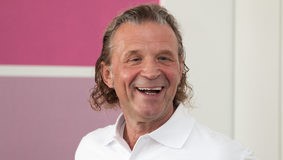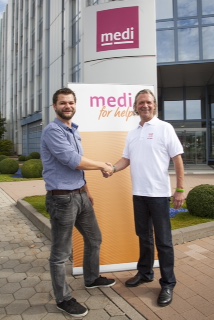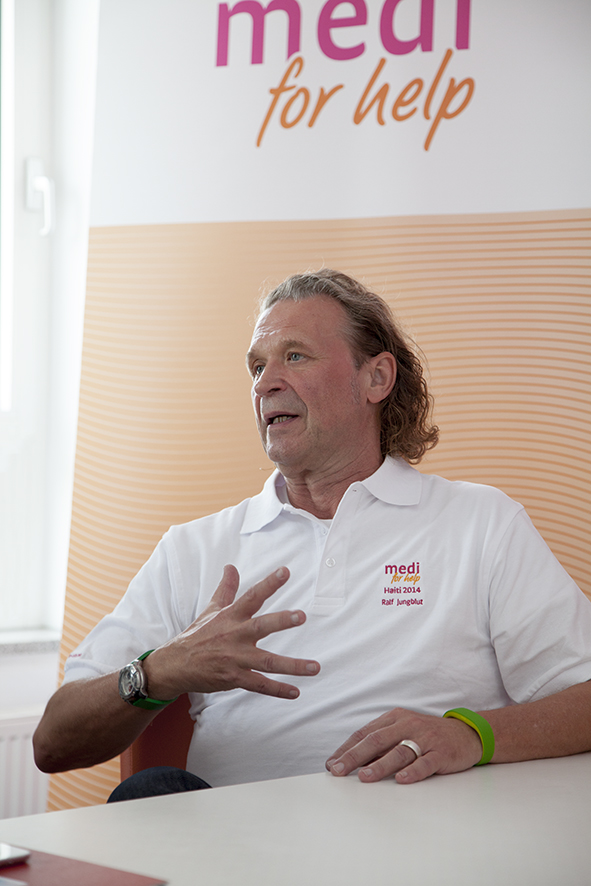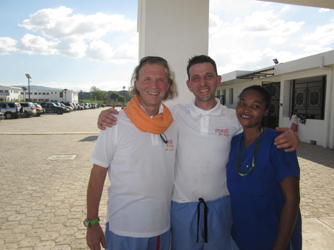
medi for help has a new workshop manager in Haiti
Interview with Master CPO Ralf Jungblut
Ralf Jungblut gained his first personal impression of the work at medi for help last summer. At the time, the 55-year-old master CPO was on a two-week voluntary mission for the relief project. He has been back in Haiti since 28 October. For a year. His duties: Run the prosthesis workshop in Deschapelles and coordinate the satellite workshop in Port-au-Prince. Before his departure he gave medi for help an interview and told us, among other things, what prompted him to undertake this commitment, and what targets he would like to achieve.
Mr Jungblut will be running the medi for help workshop in Haiti starting in November.

How did you come to hear about the relief project?
I first found out about the relief project about four years ago in the media. Ever since then I’ve been following the development of medi for help from a distance with keen interest, and I’m inspired by what has happened during that time. I wanted to go to Haiti as the workshop manager two years ago. But it never happened for a variety of reasons. So I’m more pleased than ever that I’ll be a part of the project for a year starting in November.
Last summer you spent two weeks as a volunteer with medi for help in Haiti. What impressed you most during this time?
First I was fascinated by the landscape, then by the conditions under which the people there spend their days. That’s very different to life here in Germany. For example, I don’t need an alarm clock there because the cock crows at four o’clock every morning (laughs). That’s not something you have to get used to here in Germany. Add to that the new smells, the climate, nature, and naturally how friendly the people are. Despite the numerous difficulties, they have an admirable inner friendliness. The Haitians’ living conditions are extremely simple, but the people just don’t show how difficult it is for them to overcome the daily hurdles. Improvisation there is written with a capital “I”.
How easy is it getting to know the Haitians?
Very easy. I was greeted warmly as a pale-faced European and they soon took a shine to me. Once I had got to know my colleagues in the workshop, I looked forward to caring for the patients with them every day. Working together was great fun during those two weeks, and it was a fantastic experience.
What sorts of care did you provide while you were there?
We spent most of the time providing orthoses, particularly leg orthoses.
Were there any special challenges?
We had to improvise every now and again because not all the materials were available all the time. For instance, we ran out of cast resin. So we simply switched to making the orthoses out of polyethylene material. That worked just as well. It’s surprising what can be done simply by trying.
What are the main differences between a working day in Germany and a working day in Haiti?
They don’t have any statutory health insurers (laughs). They don’t have any of all that administrative work we have to do here. Of course, courses of treatment are also documented in Haiti, and they do keep patient records. But all within reasonable limits. Most of the time you can really concern yourself with the patients, make up orthoses and prostheses, chat with colleagues, and put treatment into practice. That is the major difference which, from my point of view, is a real luxury.
How well is the workshop equipped? Are there any limitations?
No. The workshop and the materials, if they are all there, in Deschapelles are no different to those in Germany. It takes some getting used to working with the metric and the imperial systems. But you get the hang of that quickly too.

The leg amputations are no longer attributable to the earthquake in 2010. What other causes are there?
The dreadful motorbike and car accidents are noticeable. That’s really a problem in Haiti. The roads are relatively bad, and the driving style is, well, hazardous to say the least. These two factors together often lead to terrible accidents that often end with amputations.
You’re now returning to Haiti for a year as manager of the workshop. What has spurned you on to work in a disaster area?
Even if sounds melodramatic, I want to do good, and to help the people in the region. That’s my main motivation. The mission is also a great chance to broaden my own horizon and to lift my know-how to a new and different level. A foreign country with its culture and its people offers a lot of potential for further self- development, both at work and at a personal level. So that’s why I’m so looking forward to working in the workshop and all those new experiences.

How did you find co-operation with your international colleagues?
Excellent. For example, we had a morning report every day at the Albert Schweitzer Hôpital. That’s a brief summary of everything that happened in the various departments the day before. At the end, one of the departments was given a chance to hold an extra 15-minute lecture. As a rule these were PowerPoint presentations held in English and French by one of the doctors from Haiti, Europe, America or Canada. The doctors introduced themselves and their specialties briefly, and explained what sort of treatment they were currently supervising. This gave us fascinating insights and an overview of all the departments and their treatment methods. We all worked very closely together in other respects. You stop to chat, give helpful hints, and help each other when there are problems. The processes all ran smoothly, not least thanks to the interdisciplinary composition of the team. That was one of the best experiences during my period as a volunteer.
You became familiar with the work of the current workshop manager, Cornelia Köhler. What work do you want to continue with, and what personal accents to you want to set, or what projects do you plan to put in place?
First I’d like carry on with Cornelia’s fantastic work and become familiar with the tasks of a workshop manager as quickly as possible. And of course, after that I want to try and develop processes and procedures further. One specific project will certainly be to optimise training for the members of staff.
What does your family say, now you’re going to be overseas for quite some time?
I’ve already been flirting with the idea of a long-term commitment to medi for help for the last two years. So as far as that’s concerned, this comes as no large surprise for family and friends. It was very important for me to have the support of my girlfriend, and I do. Obviously it’s not an easy decision to leave her behind for a year. But thanks to the Internet I’ll still be in close contact with home.
Many thanks for the interview.